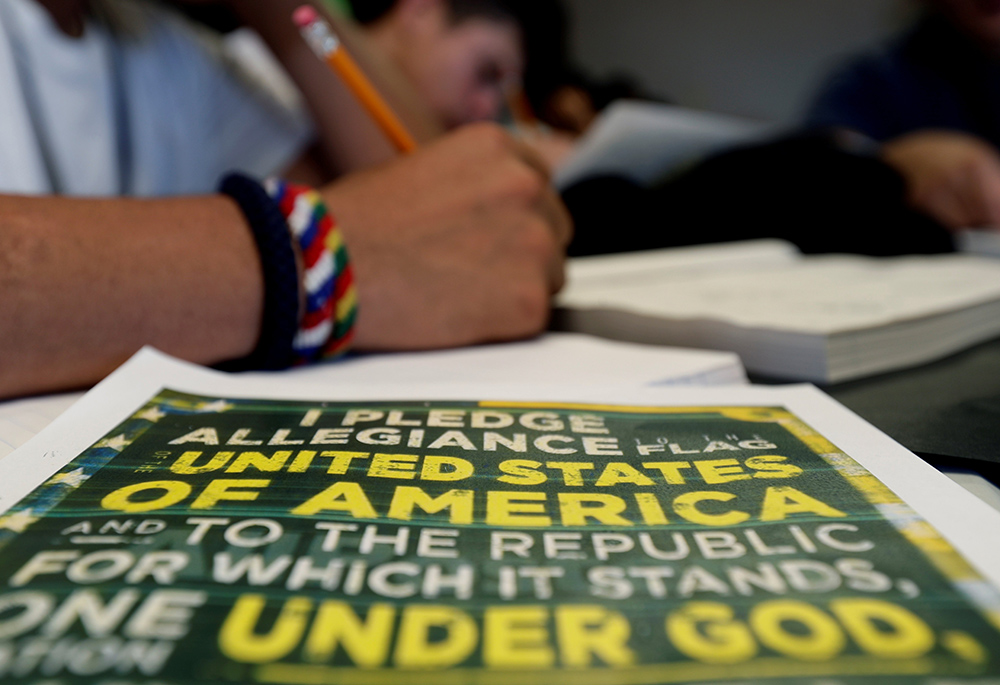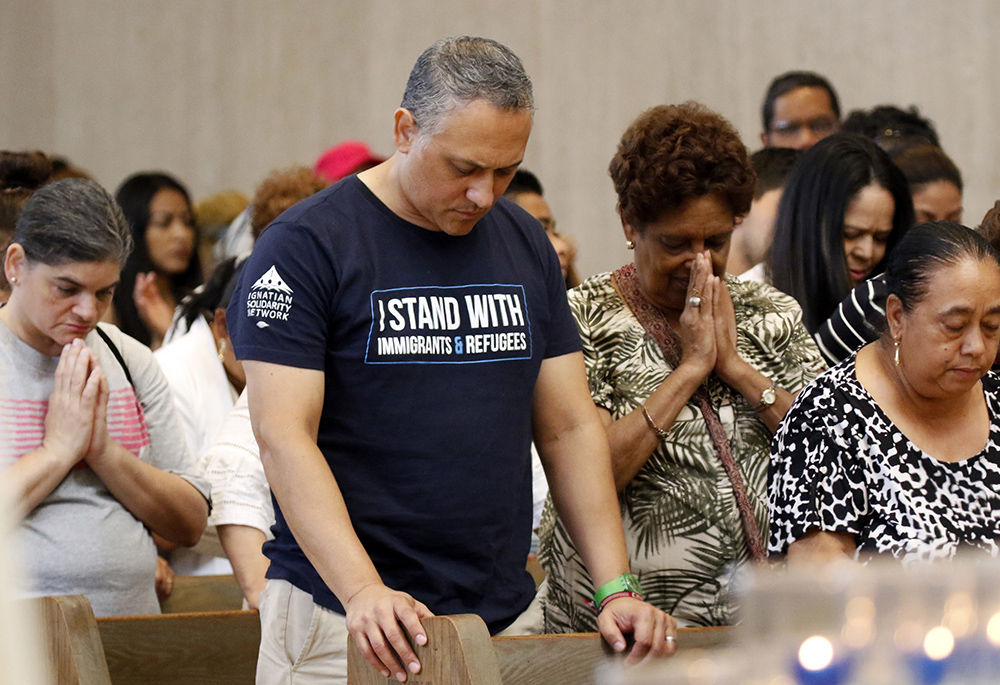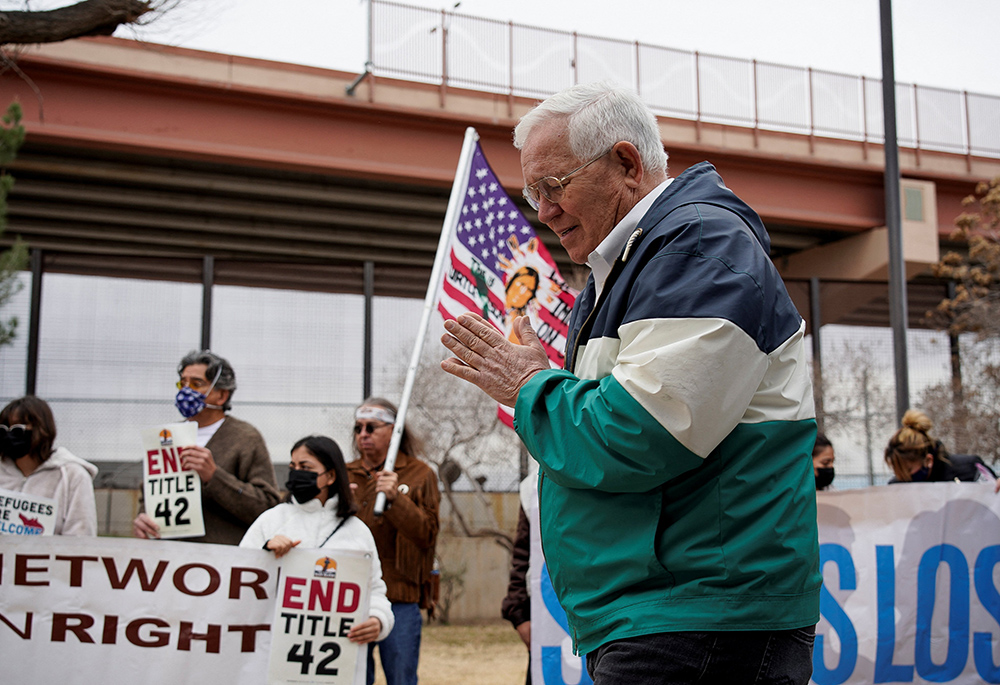
A copy of the Pledge of Allegiance rests on a desk next to an immigrant in a writing class at the U.S. government's holding center for migrant children in Carrizo Springs, Texas, July 9, 2019. (CNS/Eric Gay, pool via Reuters)
Esther Ngemba was 5 years old when civil war came to her city in the Democratic Republic of Congo in 2005. As the soldiers banged at the heavy front doors of her home, Esther's two teenage sisters hid between mattresses upstairs to avoid being raped or abducted. Esther remembers her mother cuddling her tightly as she descended the stairs. "Usually if you are holding a baby the soldiers show more empathy," she told me. But it didn't help.
The soldiers ordered Esther's mother to kneel, and then put a gun to her head. As they cocked the trigger Esther remembers, "Mom kept praying and repeating Jeremiah 33:3, 'Call to me and I will answer you.' " Miraculously, the pistol did not fire. As distant gunshots rang out, the soldiers fled — but not before promising to return. Esther's family didn't wait. Hurriedly packing a few belongings, they journeyed to Uganda, where they were eventually granted refugee status through the U.N. High Commission on Refugees.
In 2011, a U.S. refugee collaborative chose the Ngemba family for settlement in Cleveland, Ohio. Esther received a full scholarship to my community's St. Joseph Academy, where a teacher encouraged her to tell her story and advocate for immigrants and refugees. During the tense 2016 election season, one benighted classmate offered a common complaint about immigrants: "Well, why are immigrants and refugees coming here? They can just go back where they came from."
Esther gave an impassioned reply. "People cannot just go back where they came from," she told the girl. "It is not that simple. My family came here as refugees, but if you gave us an option, nobody wanted to come. We were literally running for our lives. Most people are coming to this country because they are fleeing violence or fleeing war."
Esther would go on to share her story with many groups — including at the United Nations — during her college years at John Carroll University. Since 2020, she has launched two local businesses: Furahi: A Taste Of Home (Furahi means "happiness" in Swahili) which spreads the love of Congolese food, and Unapendeza, ("You look beautiful") which sells exquisitely crafted dresses, aprons and tote bags to showcase the work of Congolese women artists. Ten percent of all proceeds go to help Congolese girls.
Today when she is asked about immigrants, Esther says, "We don't want your job. We want to help the American economy." Every member of Esther's family is now a proud, tax-paying U.S. citizen.

Worshippers pray during a Spanish-language Mass for immigrants July 13, 2019, at St. Frances Xavier Cabrini Shrine in New York City. The liturgy was part of the shrine's daylong celebration marking the birthday of its patroness. An Italian immigrant born July 15, 1850, Mother Cabrini was the first U.S. citizen to be canonized and is the patron saint of immigrants. (CNS/Gregory A. Shemitz)
Jewel Yokie is also an accomplished graduate of St. Joseph Academy in Cleveland, as well as Kent State University. In 2005, at age 7, she came to the United States from Sierra Leone with her Liberian parents and three siblings. Jewel's parents had fled Liberia after being held hostage by rebel forces during the civil war (1989-1997). The rebels were recruiting children to be child brides and child soldiers. Jewel's parents fled to protect them from this fate. The family applied for refugee status in Sierra Leone, where Jewel and her sister Joan were born.
After arriving in Cleveland, the Yokie family experienced what Jewel calls a "network of welcome" that included Cleveland Catholic Charities, the Sisters of St. Joseph, the Sisters of Notre Dame, Pastor Bob Begin and the parishioners of St. Colman parish. Begin's many contacts soon resulted in employment for Jewel's father and two of her siblings, while the Sisters of St. Joseph not only found work for Jewel's mother but helped Joan and Jewel matriculate at St. Joseph Academy. All family members are now proud U.S. citizens.
When she finished college, Jewel accepted a position as senior manager of the Hope Center, a branch of Building Hope in the City, an organization that partners with refugees and immigrants to provide community connections, family mentorship, employment, immigration counsel and afterschool enrichment and tutoring. The faith-based, not-for-profit agency grew from the Lutheran tradition and currently serves over 250 refugees and immigrants each week. Last year Jewel helped place more than 100 refugees into new or better job positions via the organization's many employment partners.
Advertisement
US economy benefits from immigration
Jewel and Esther are just two examples of the valuable contributions immigrants make to our way of life and to the U.S. economy. The destructive anti-immigrant rhetoric of President-elect Donald Trump has no basis in fact. An October report from the Economic Policy Institute listed the many substantive economic benefits of immigration. In addition to an expanded U.S. gross domestic product, or GDP, immigration "has led to better, not worse, wages and work opportunities for U.S.-born workers." While both Esther and Jewel have legal status and are now citizens, experts say the U.S. economy will not continue to thrive without the estimated 11 million undocumented immigrants that President-elect Trump is promising to deport.
Trump's deportation will cost at least $315 billion and could lead to a 4.2%-6.8% loss of the annual GDP which translates to $1.1 to $1.7 trillion. U.S. industries — particularly construction, agriculture and hospitality — could be very hard hit if they lose their undocumented employees. Trump's plan is reportedly causing "panic" among farmers, with experts warning that it could cut the U.S. agricultural workforce by nearly half. Jennifer Tilton Flood, a Maine dairy farmer, recently told Newsweek: "Mass deportations could affect our entire dairy industry throughout the U.S."
Catholic teaching
Economic benefits aside, Pope Francis, the U.S. bishops and Catholic social teaching have long championed the human dignity and rights of refugees and migrants. During an audience in late October, Pope Francis condemned the scandal of Italian apple growers who exploit migrants. He decried the many human lives being lost owing to a "dramatic confrontation between the interests of those who hoard their wealth and the struggle of those trying simply to survive by fleeing from hunger and persecution." Migrants are to be welcomed and integrated into their host communities, he said. They should also be "viewed as a gift of God, unique, sacred, inviolable, a precious resource for the benefit of all."

Ruben Garcia, director of Annunciation House, attends a march Jan. 7, 2023, in downtown El Paso, Texas, to demand an end to the immigration policy called "Title 42" and to support the rights of migrants coming to the border. A state judge ruled July 2, 2024, that Texas Attorney General Ken Paxton's effort to shut down Annunciation House, a Catholic nonprofit serving migrants, violated the Texas Religious Freedom Restoration Act. (OSV News/Reuters/Paul Ratje)
We Catholics are now being called to stand with immigrants and migrants. It is my fervent hope that our U.S. bishops proactively uphold Catholicism's longtime commitment to refugees and migrants. If their strong statements about immigrants during Trump's first term are any indication, I expect them to raise a powerful voice opposing Trump's xenophobic policies. They — and we — could take a cue from El Paso's Annunciation House and invoke our right to the free exercise of our religion, which calls us to serve the needs of our suffering sisters and brothers.
After the election, Esther was approached by a white man who told her, "This is Trump's America now, you [racial slur] better get in line."
It is time to stop the hate. It is time to take a stand on behalf of the "gift of God" and the "precious resource" of our immigrants.




